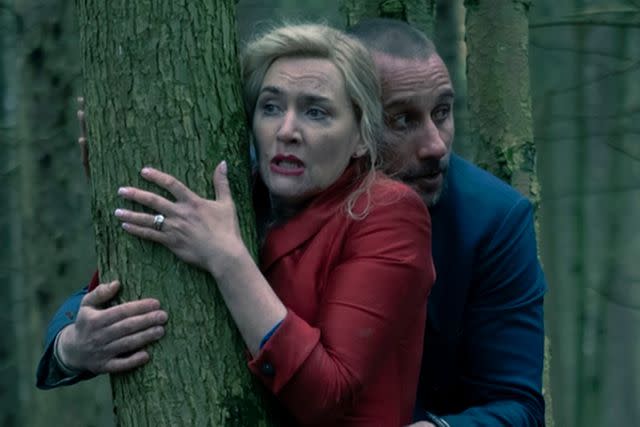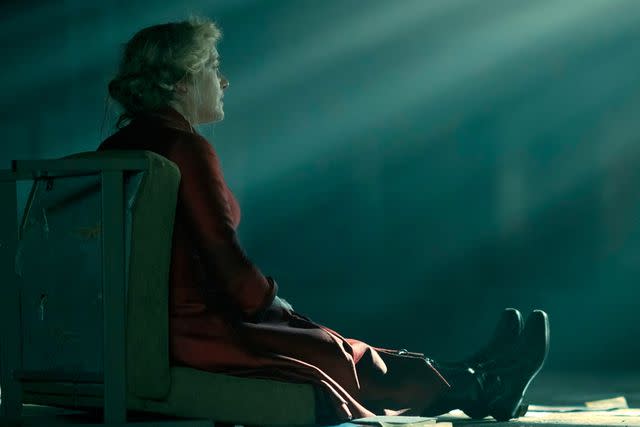“The Regime” creator on that coup of a finale, alternate endings
- Oops!Something went wrong.Please try again later.
"I might not always have the rosiest outlook," Will Tracy tells EW.
Warning: This article contains spoilers about The Regime season finale, "Don't Yet Rejoice."
The Regime has been toppled. Sort of.
Sunday night's conclusion to HBO's The Regime brought things full circle, pretty much literally. Elena (Kate Winslet) goes on the run with Zubak (Matthias Schoenarts) when the palace walls are breeched. She and Zubak attempt to find help from local citizens, as they try to evade the rebels.
But eventually, they are captured and discover that some of her former ministers, including Singer (Henry Goodman), have been working to bring down Zubak and his unhinged influence with the aid of the United States, who wish to see their interests in cobalt protected.
Elena, in a final bid for power, sacrifices Zubak and she retains her title, only now as even more of a figurehead with significantly increased oversight from her ministers. Zubak replaces her father, and Elena now visits his corpse to talk through her anxieties.
In a sense, one version of this autocracy is replaced with another — and nothing changes much for the people who live at the whims of the ruling class. It's not a very hopeful ending, but it is, sadly, a realistic one. So, we called up creator Will Tracy to get his take on the finale, from potential alternate endings he had in mind to whether or not Elena ever truly loved Zubak.

Miya Mizuno/HBO
Kate Winslet and Matthias Schoenaerts on 'The Regime'ENTERTAINMENT WEEKLY: The whole series builds to this mostly successful coup. But did you have any alternate endings in mind, like Elena dying, or her and Zubak winning out? What were those conversations like?
WILL TRACY: My initial early version of it was a bit like the end of [Romanian dictator] Ceaușescu's regime — where she's on the run and they nab her and it's a very quick, hastily convened tribunal, and then she's hanged in the town square or whatever. Just by default, I thought she would get her just desserts. But with a sense that what might be replacing her might not necessarily be vastly better. But that was really only because I hadn't put much thought into it until later into breaking this season.
I landed on this idea of, what if it's pressing the reset button on the Nintendo? And it all loops back to the beginning, but with those who survive carrying these emotional scars from what transpired. Yet the political story, as it often happens in our world, runs cyclically back to where it started. That seemed like, even though she lives and survives, in some ways more tragic than an everyone dies and is brought to justice ending.
Is it fair to read the ending as she agreed to abide by all the ministers' demands and sacrificed Zubak?
Yeah, I would say so. He's sacrificed on the altar of regional political strategy. The arrangement that she had at the very beginning, which made her feel placated and secure, ultimately is the only relationship via which she can survive. And survival is really all she cares about. Really, what any autocrat cares about is hanging on to power because they know on the other end is the Hague or a noose in a town square. So, it goes back to the relationship that worked with slightly different optics, but she's letting herself become a pawn in the new clean energy economy and the new Cold War against China. But she's happy to do that if it means she gets to hang on.
Given Zubak's reputation for brutality, I expected him to go a bit more Scarface last-ditch effort at the end there. Why did you decide to let him go more peacefully in the end?
We did talk about that, that maybe this guy would want to go out in his blaze of glory. But he sees the pointlessness of that. And also, he's willing to do this for her. He's not necessarily a well-read man or a political scientist, but in some way he understands that in order for her to tell this story that she needs to tell in order for her to survive, he needs to be the sacrificial lamb. It's inevitable in some fatalistic way that that's the way their love story has to end.

Miya Mizuno/HBO
Kate Winslet on 'The Regime'Speaking of which, does any part of her truly love him?
You could ask this question about a lot of different love stories. She loves the way that he made her feel about herself. A very cynical person might say that that's every relationship. I'm not quite so cynical. He made her feel strong and capable in a way that she did not before. There was something about his strength, simplicity, clarity, steadfastness, and loyalty that she loved. Is someone like Elena, a true narcissist, really capable of loving anyone more than herself? No. It's not that kind of love. If that's how you define love, loving someone more than you love yourself, I'm not sure she's quite able to do that.
In terms of her own self-delusion, does she feel she's won at the end?
The final scene of the show in the mausoleum, what I read on her face is not victory. It's not triumph. Maybe that's the mask that she can convince herself to wear through some cognitive dissonance when she's up there in that glass box on the balcony giving a speech. Maybe she feels quite powerful and victorious. But as it used to be with her father, when she goes down in that mausoleum and visits the remains of someone who knows the real her and the mask can drop a little bit, she knows that, in some large way, at least emotionally, she has lost.
You talked about the cyclical nature of these things, and how often we trade one autocrat or a regime for another. What do you hope audiences take away from that? It can feel futile.
It is not always futile. There are a few different hinge points on the show in which things could have gone differently. It just so happens that she chooses, at every tack, the wrong way. This kind of leadership doesn't last forever. As much as they try to hang on to power, they can never hang on forever. Something gets them in the end, even if it's just old age. And sometimes you have to wait that out because the consequences of a more interventionist violent regime change can be even more catastrophic. I'm not giving a very hopeful answer, but sometimes it really is a case of letting the political will and the leadership play its course. I'm not sure what the answer is beyond that. I might not always have the rosiest outlook.
This interview has been edited for length and clarity.
Sign up for Entertainment Weekly's free daily newsletter to get breaking TV news, exclusive first looks, recaps, reviews, interviews with your favorite stars, and more.
Related content:
The Regime creator calls it 'a fairytale' within the trappings of a satire of autocracy
The Regime's Hugh Grant says going into politics has 'crossed my mind'
The Regime review: Kate Winslet's dictatorship dramedy falls flat
Read the original article on Entertainment Weekly.

